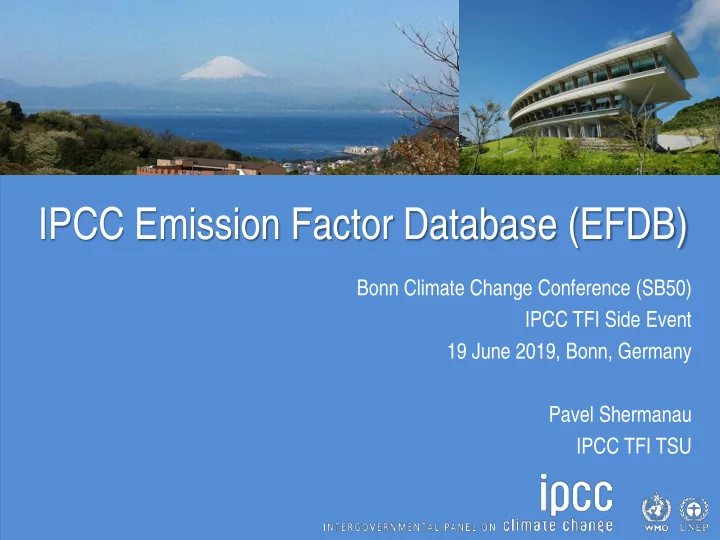

IPCC Emission Factor Database (EFDB) Bonn Climate Change Conference (SB50) IPCC TFI Side Event 19 June 2019, Bonn, Germany Pavel Shermanau IPCC TFI TSU
Background • Quality of GHG inventories depends on reliable emission factors and activity data • Desirably, emission factors that reflect national circumstances should be used in inventory compilation • Development of such emission factors is costly, time consuming and requires expertise • By sharing data/information, emission factors that can be used in specific conditions/national circumstances can be obtained cost- effectively ― Users decide if data is suitable in their specific situation • An easily accessible public EFDB with supporting scientific information would help improve the quality of GHG inventories in a cost-effective way • IPCC EFDB was launched in 2002
IPCC EFDB (1) • Library of emission factors/parameters and other relevant data with background information ― Default values from IPCC Guidelines ― Data from peer-reviewed scientific papers ― Data from other publications (government reports, industry studies etc.) • Communication platform to share data and information that can be used for estimation of GHG emissions/removals
IPCC EFDB (2) • Evolves dynamically: data proposals (e.g. voluntary submissions from inventory compilers, researchers) and data collection efforts (e.g. expert meetings to collect data) • Open to any data proposals ― Data proposals are considered by EFDB Editorial Board for inclusion into the EFDB ― Criteria for inclusion of new data: robustness, applicability and documentation ― Contact IPCC TFI Technical Support Unit (TSU) at ipcc-efdb@iges.or.jp
Importance of EFDB • In the context of National Communications from non-Annex I Parties, the Consultative Group of Experts (CGE) recommended ― Improvement of data quality by enhancement of the sharing of country- specific emission factors through the IPCC Emission Factor Database and among Parties not included in Annex I to the Convention ( FCCC/SBI/2011/5/Rev.1 ) • New reporting guidelines on annual inventories for Annex I Parties ― If Annex I Parties lack country-specific information, they could also use EFs or other parameters provided in the IPCC Emission Factor Database, where available, provided that they can demonstrate that those parameters are appropriate in the specific national circumstances and are more accurate than the default data provided in the 2006 IPCC Guidelines ( Decision 24/CP.19 )
How to access EFDB • Two types of applications: ― Web application ― Offline application • The web application is the core of the system. New data will be made available in the web application first • The offline application works with MS Access MDB file which contains the copy of the web database ― Can be used on a stand-alone PC ― Available for download at the EFDB website http://www.ipcc-nggip.iges.or.jp/EFDB/main.php
Web application (1)
Web application (2) Search options (e.g. Basic search) Specify gas, type of parameters etc. Status of search To narrow down search results Details of data Results can be exported in Excel
Populating EFDB (1) Data Provider Defaults EFDB Accepted Data Data Editorial TSU Data Initial check of Board • data proposals Meeting (EB) Data Data Collection of new • data and preparation of data proposals
Populating EFDB (2) • Expert meetings to collect data (Data Meetings) have been organized since 2008 ― Focus on specific sectors/categories with the aim to identify, select and approve data for inclusion into the EFDB ― Attended by experts/data providers and Editorial Board members ― 16 th Data Meeting (DM16) was held on 14-15 November 2018 in parallel with 16 th Meeting of Editorial Board in Buenos Aires, Argentina. The DM16 focused on data for Land Use, Land-Use Change & Forestry and Waste sectors Literature search (e.g. peer-reviewed journals, National Inventory • Reports)
Enhancement and improvement of EFDB • Upgraded new version of the EFDB was released in May 2018 ― Multi-assignments of IPCC categories and gases ― Improvement of data entry process/import functions ― Unicode support ― Additional gases added to the nomenclature for IPPU sector Other improvements (e.g., publication of “Other Databases” page) • User-interface is being further improved •
Thank you http://www.ipcc-nggip.iges.or.jp/index.html https://www.ipcc-nggip.iges.or.jp/EFDB/main.php
Recommend
More recommend